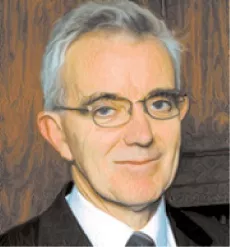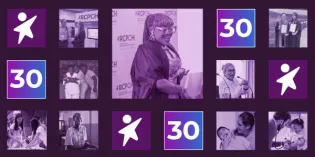
Start year of presidency: 2003
End year of presidency: 2006
Year James Spence Medal awarded: 2008
Alan Craft was born and educated in Newcastle upon Tyne qualifying in medicine in 1969. A pre-registration house officer post in paediatrics at the Royal Victoria Infirmary was the beginning of his paediatric career. An opportunity to look after children with leukaemia to cover maternity leave was the start of specialisation in paediatric oncology which was just beginning to develop.
An MRC Fellowship in London at the Royal Marsden Hospital allowed him to meet others around the country who were pursuing oncology and he was one of the nine founder members of the United Kingdom Children’s Cancer Study Group which met for the first time in Birmingham in 1977. Each was given a particular type of cancer to lead to develop international links and treatment protocols. He was allocated bone tumours and spent the remainder of his career leading UK and international trials in this important area. Appointment to a consultant post in North Tyneside, which included general, neonatal and community paediatrics, in 1978 included four sessions each week in Newcastle to develop a paediatric oncology service.
In 1986 he moved full time to Newcastle as a paediatric oncologist with a small general paediatric commitment. An SHO post in rheumatology during training led to an interest in children with joint disease and he established a paediatric rheumatology service. He was secretary then chairman of the UKCCSG and then secretary general and President of the International Paediatric Oncology Society from 1999 to 2005.
In 1996 he was elected to the Council of the BPA at the time that it was becoming the RCPCH. From 1998 to 2003 he was Vice President for Education and training, and then elected President. From 2004 to 2007 was also chairman of the Academy of Medical Royal Colleges.
Palliative care for children with cancer led to him helping develop services for children with life threatening and life limiting diseases and he has been President of the Association for the Care of Children with Life Limiting Disease, now Together for Short Lives, since 2005.
Research interests include paediatric oncology, especially bone tumour clinical research and epidemiology. He has led an oncology research unit which has been involved in aetiological studies and in particular the role of irradiation in the development of childhood cancer. His paper in 2012 in the Lancet on the effects of CT scans in children, for non-malignant conditions, and the subsequent risks of developing leukaemia and brain tumours has been cited more than 800 times, making it the most cited of more than 400 papers which he has published. It has changed practice all over the world. The clinical trials which he devised and led for osteosarcoma and Ewing’s sarcoma are the basis of standard worldwide care for these conditions.
During the time of being President he was faced with a serious problem around safeguarding, with many paediatricians being very reluctant to get involved in this stressful area because of potential complaints against them. Many designated and named doctor posts were unfilled. Along with other College Officers, in particular the Registrar Sheila Shribman, the College developed training programmes and an evidence base to give paediatricians the confidence and competence to undertake this core aspect of the work of all paediatricians. As a member of the Postgraduate Medical Education and Training Board and the GMC, he was responsible for developing systems of equivalence so that experience as well as training could be used to assess suitability for entry onto the Specialist Register.
He was awarded the James Spence Medal of the RCPCH in 2008 and knighted by her majesty the Queen in 2005 for services to medicine and paediatric oncology.







